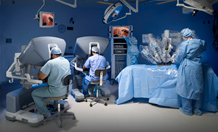
The da Vinci surgical robot.
©2013 Intuitive Surgical, Inc.
Pioneering robotic surgery research taking place in Exeter
Pioneering new research in robotic surgery is forging ahead thanks to a partnership between the University of Exeter and the Royal Devon and Exeter NHS Foundation Trust (RD&E).
Dr Sam Vine and Dr Mark Wilson from Sport and Health Sciences at the University of Exeter are the recipients of a prestigious grant from Intuitive Surgical in California, manufacturers of the da Vinci surgical robot, to examine the benefits of robotic surgery for surgeon training and performance under pressure.
To celebrate the beginning of the research programme, and heralding the launch of prostate cancer awareness month, members of the public are being given an opportunity to try their hand at robotic surgery. On Thursday 28th February a demo robot, complete with computer console, will be located in the main reception of Wonford Hospital in Exeter. Surgeons will be on hand to answer questions and demonstrate how the equipment is used. Visitors will be invited to try out the robot for themselves – on peas rather than patients! Hospital staff and prostate cancer support groups will also be available to advise on symptoms, treatment and local support services.
The Trust took delivery of its first £2.5 million in state-of-the-art robotic equipment in late December 2012 and is one of around only 20 hospitals in the UK now using robots in complex surgery to target prostate cancers.
During robot-assisted surgery, the surgeon sits at a remote computer console to operate and control four robotic arms that carry out the guided surgery. The surgeon watches and guides the whole procedure on a high-definition computer screen with 3-D vision.
Research and clinical tests have already confirmed the benefits and safety of robotic surgery for patients in certain kinds of complex surgery. These benefits include a faster recovery and reduced blood loss, for example. However, little is known about the benefits that robotically-assisted surgery may offer the surgeon and the operating team in theatre. As Consultant urological surgeon, and honorary senior lecturer at University of Exeter Medical School, Mr John McGrath explains: “Because of the robot’s precision and cutting edge technology such as 3-D vision and magnified views, it has been suggested that surgeons can be trained more quickly and will feel less stress during difficult procedures.
“If this is the case, the surgeon may be better equipped to safely deal with stressful situations during complex surgery.”
That’s what Mr McGrath and the research team are set to find out, having won a highly prestigious grant from Intuitive Surgical in California, manufacturers of the da Vinci surgical robot. The company have agreed to fully fund provision of a second robot at the RD&E for nine months to exclusively run studies looking at differences in the mental workload, stress and learning curves of novice and expert surgeons.
The findings will help inform the wider NHS about the potential benefits of robotic surgery in training the next generation of surgeons safely, within a timely fashion and with technology that may help them deal more effectively with stressful aspects of surgical procedures.
Dr Sam Vine commented, “The new research programme builds on a previous three-year research programme between the surgeons at RD&E and researchers at the University of Exeter. We’ve been working to further our understanding of differences in the eye-hand coordination of expert and novice surgeons and how these attributes can better be trained. We have applied our knowledge from our earlier research in sport, to devise a ‘gaze training’ programme, which teaches trainee surgeons to adopt the eye movements of experts. This appears to help new surgeons learn surgical skills more quickly and to perform these skills in stressful conditions similar to the operating room. Now we’ll be extending that research to understand how similar advantages can be applied to robotically-assisted surgery.”
According to Mr McGrath, the research programme signifies an ever growing relationship between academics and clinicians: "We have a longstanding partnership with academic and clinical researchers to develop innovative ways of working to benefit patients. Creation of the South West Peninsula Academic Health Science Network will see this type of work rapidly and more widely adopted so that more people in Devon, Somerset, Cornwall and the Isles of Scilly can benefit from these advances in healthcare."
Date: 19 February 2013
